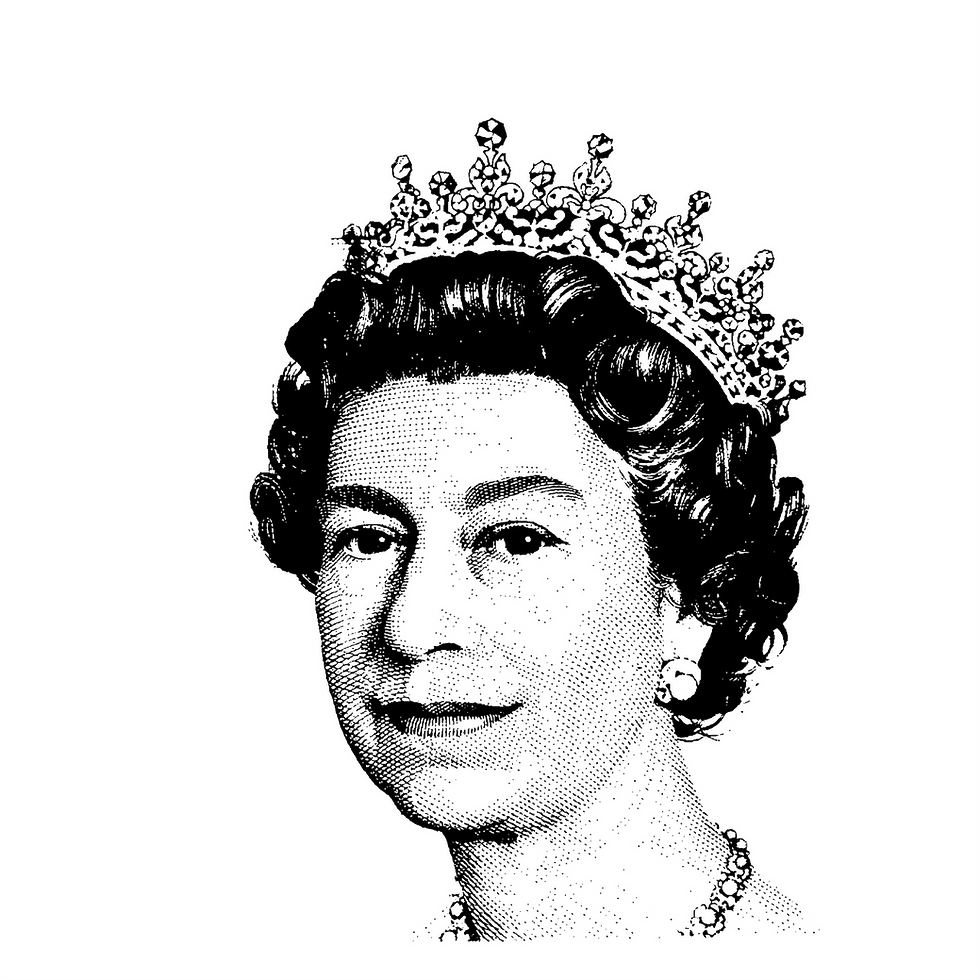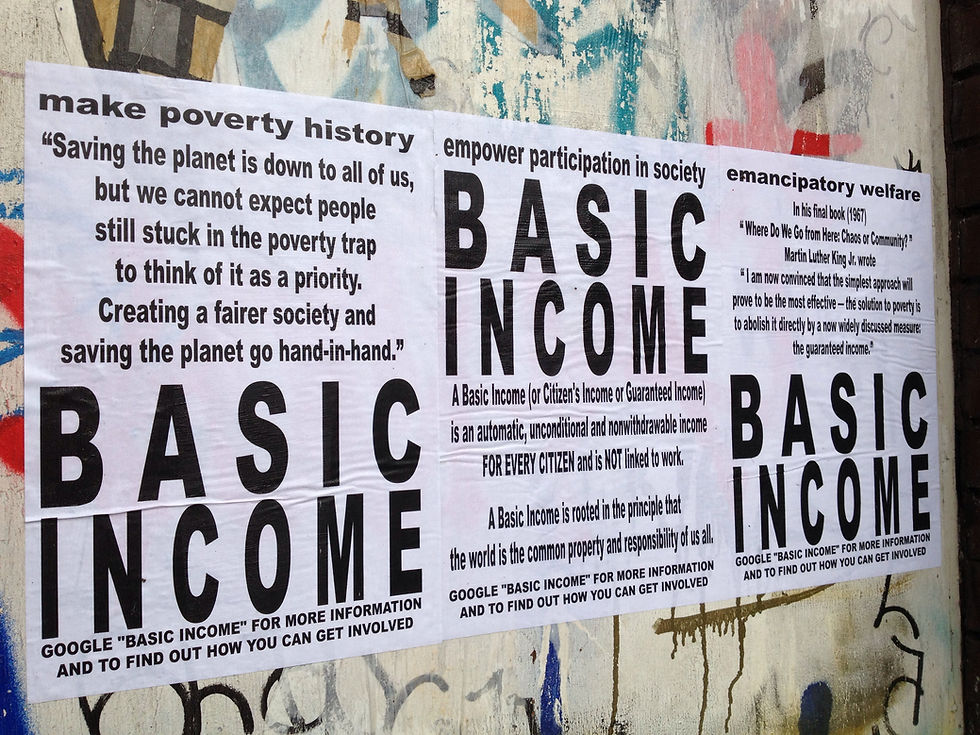How the UK Has Reacted to the Queen's Death
- Elizabeth Bratton

- Sep 14, 2022
- 7 min read
Updated: Dec 23, 2024
Following the death of Queen Elizabeth II on Thursday the 8th of September, the United Kingdom entered a period of mourning that will last until the end of Monday the 19th of September, the day of the Queen’s funeral. While many UK citizens are grieving the loss of the longest reigning monarch in British history, some have also been questioning the rationality of certain responses to her death.

Immediately after news of the Queen’s death broke, mourners flocked to show their respects by laying flowers in Green Park, near Buckingham Palace. The other, perhaps less expected items, to appear at the memorial were marmalade sandwiches. For the Queen’s Platinum Jubilee, screenwriter Frank Cottrell-Boyce depicted the Queen and fictional Peruvian bear Paddington, chatting over tea in Buckingham Palace. Paddington Bear is famous for his love of marmalade sandwiches, prompting mourners to leave them at memorial sites for the Queen.
Park officials have now had to ask mourners to stop leaving marmalade sandwiches at the memorial site. The Royal Parks organisation is responsible for managing floral tributes following the Queen’s death, and has explained that the sandwiches are causing a “negative impact on the park’s wildlife”.
Amid the cost of living crisis, some food banks now fear they might have to turn people away, or reduce their emergency ration parcels. Organisations representing 169 food banks noted that the number of people requiring their aid has increased “dramatically”, foreseeing “bleak and disturbing” weeks ahead. 75% of these food banks have observed a reduction in food donations, with the Kirkcaldy food bank in Scotland suggesting that those who might usually donate food have reduced their donations in order to provide for themselves.
This has prompted criticism of unnecessary food wastage. Journalist Diyora Shadijanova tweeted: “I just wonder how many of the people who made marmalade sandwiches for a dead monarch have ever made them for the living poor,” while @darraghsongs tweeted: “if you're laying marmalade sandwiches at green park, could you maybe donate that loaf of bread and jar of marmalade to a food bank instead? [sic]”
Monday the 19th of September will be a bank holiday. A small number of food banks have announced that they will be closing out of respect for the Queen. Wimbledon Food Bank posted a now-deleted tweet stating that it would be closed “due to funeral”, but has now tweeted: “UPDATE: Due to the overwhelming support we have recieved we now have volunteers to run our Monday session as usual. As a reminder we are not a government service and run solely on peoples donations of time, money and food. [sic]” The three distribution centres of the Stoke-on-Trent branch of the Trussell Trust will also be closed, though the organisation has not officially stated that this is an act of mourning; food banks often close on all bank holidays. A spokesperson for the Trussell Trust stated: "Food banks are all independent, but we have emailed saying it is a bank holiday and they can decide what to do,” adding: “It really depends on the local need on the ground; the volunteers will know if they are particularly quiet on a Monday, or if it is a busier day.”
Thurrock Food Bank has announced it will be closing because of the funeral: “As a mark of respect for the State Funeral for Her Majesty Queen Elizabeth II, and to offer our volunteers the opportunity to pay their respects, we have taken the decision to close our warehouse in Corringham on Monday 19 2022.” Southwark Food Bank has made the same decision on the same grounds, in order to “mark our respect on the day of Her Majesty Queen Elizabeth II’s state funeral”.
Some Twitter users have emphasised that food banks are run by volunteers who should have the right to a bank holiday, and may - in this instance - want to watch the funeral, or may need to be at home with children who have the day off from school. Others have explained that their criticism is not aimed at food banks that close on bank holidays, but, in this particular case, at the short notice at which the closures have been announced. @godlikemonolith on Twitter explained: “I don’t think many have a quibble with giving food bank workers time off or whatever else they need. I think it’s the short notice and the demand that all services support and otherwise shut down for a funeral. All the love to charity workers tho’ x [sic] ”.
Hospitals are also cancelling thousands of appointments scheduled for Monday the 19th of September, including vital appointments for cancer patients. @_gracelatter tweeted: “my friend with aggressive brain cancer, who is on borrowed time as it is, has been informed his cancer centre is closed on Monday. He now has to wait/fret for an extra 8 days for his MRI results. this makes zero sense. I’m angry.” @CorryLReilly also wrote: "My breast cancer appointment on Monday was also cancelled today. LUCKILY my consultant is going to call me tomorrow instead. My heart breaks for those left waiting. The wait is agonising enough without it being delayed because of someone else’s funeral.”
These cancellations have heightened concern at a time when the backlog of patients awaiting treatment is already high, in part due to the coronavirus pandemic. As of July 2022, there are currently more than 6.84 million patients awaiting NHS treatment, with 2.67 million of those having been waiting for over 18 weeks: the maximum waiting time for non-urgent, consultant-led treatments. Cancer Research estimated that more than 24,000 cancer diagnoses were missed since the COVID-19 outbreak, as the pandemic led to “enormous disruption” of standard procedures, while delays to starting treatment caused some patients’ cancer to become inoperable.
In addition to cancer treatments, replacement surgeries, eye surgeries, and maternity checks have reportedly been cancelled after multiple NHS trusts called for the cancellation of “non-urgent” appointments and procedures.
The arrests of republican protesters in the aftermath of the Queen’s death have also provoked controversy. On Sunday the 11th of September, a 22-year-old woman was arrested for holding a placard that read “F*** Imperialism, Abolish Monarchy”, and was later charged “in connection with a breach of the peace”. This took place before the King's Accession Proclamation outside St Giles' Cathedral in Edinburgh, and the woman will appear in court at a later date.
That same day, a 74-year-old man was arrested and charged with the same offence in Edinburgh’s Palace of Holyroodhouse.
Also on Sunday the 11th of September, 45-year-old Symon Hill was arrested after asking “Who elected him?” during the King’s Accession Proclamation. He was later de-arrested, but informed that he would be interviewed at a later date and possibly charged. He had been arrested under the Police, Crime, Sentencing and Courts Act of 2022, and was held on suspicion of a public order offence under Section 5 of the Public Order Act. Hill would only be guilty of this crime if he was found to have used "threatening (or abusive) words or behaviour, or disorderly behaviour" or "displayed any writing, sign or other visible representation which is threatening (or abusive)". Under the Police, Crime, Sentencing and Courts Act of 2022, police also have powers to impose conditions on noisy protests that might generate “serious disruption” or cause “harassment, intimidation, alarm or distress”. Critics of this act believe that it infringes upon the right to protest and freedom of expression.
Writing for Bright Green after his arrest, Hill recalled: “I remained quiet in the first part of the proclamation, concerning the death of Elizabeth. Any death is sad and I would not object to people mourning. It was only when they declared Charles to be “King Charles III” that I called out “Who elected him?” I doubt most of the people in the crowd even heard me. Two or three people near me told me to shut up. I didn’t insult them or attack them personally, but responded by saying that a head of state was being imposed on us without our consent.” Hill states that the police did not offer any reason for his arrest until they were driving him back to his house, after handcuffing him and taking him into the back of a police van.
On Monday the 12th of September, a 22-year-old man, identified as “Rory”, was arrested in Edinburgh, after heckling Prince Andrew as he walked behind the Queen’s coffin. He shouted, “Andrew, you’re a sick old man!” at the Duke of York, who was accused of sexual assault by Virginia Giuffre. He too has been charged in connection with a breach of the peace. In a video uploaded by journalist Joseph Anderson, Rory said: “Powerful men shouldn’t be allowed commit sexual crimes and get away with it.”
Some social media users were outraged after witnessing a video of Barrister Paul Powlesland interacting with police while he held up a blank piece of paper near the Houses of Parliament. Powlesland was reportedly threatened with arrest: “Just went to Parliament Square and held up a blank piece of paper,” he tweeted. He continued: “Officer came and asked for my details. He confirmed that if I wrote ‘Not My King’ on it, he would arrest me under the Public Order Act because someone might be offended.”
In response to the video, a small group of protesters held up blank signs on St Giles Street in Edinburgh, just a short distance from where the Queen’s coffin was lying.
The incidents have sparked a debate surrounding free speech. While much of the country is grieving and mourners may deem this period an inappropriate time to express anti-monarchy views, the fundamental right to free speech remains protected under Article 10 of the Human Rights Act 1998. Deputy Assistant Commissioner of the Metropolitan Police, Stuart Cundy, has clarified: “The public absolutely have a right of protest and we have been making this clear to all officers involved in the extraordinary policing operation currently in place.”
The prime minister’s spokesman has acknowledged that, while national mourning is indeed taking place, “the right to protest does remain a fundamental principle”.

_edited.png)



God save the King!